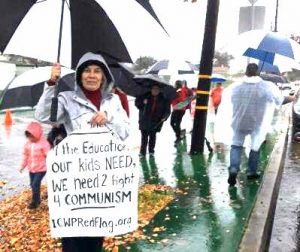
LOS ANGELES, USA, January 25— Enthusiastic school-site picket lines and mass rallies downtown over six days (four of them in pouring rain) built solid unity at nearly 900 schools and inspired workers around the world.
Thirty thousand teachers and other school workers won the active support of tens of thousands of parents and students and other workers, including firefighters.
The strikers’ commitment strengthens our confidence that the working class can fight for the communist world—and the communist education—that we need.
It was a political strike for better schools. It highlighted the devastating attacks by the charter school privatizers, and isolated those capitalists who have pushed the charter movement.
The agreement sets a limit—still way too high—on class size. It promises more nurses and librarians as well as thirty new community schools with a range of social services. It has vague language about limiting charter schools and improving school funding.
Not everyone was happy about the agreement, or the rushed vote on it. However, most teachers see this as a victory, especially since it came with no cuts to health care and a 6% pay increase.
The real victory for the working class is that more parents, teachers and other school workers are talking about communism.
More than a dozen ICWP comrades went to the picket lines at ten different schools and the mass rallies. We were out there every day. We distributed hundreds of copies of leaflets, hundreds of Red Flags, hundreds of copies of our pamphlet “Communist Education for a Classless Society.” (icwpredflag.org/epe.pdf)
In some schools we have known teachers, school workers, and parents over the years. We re-established political relationships with them.
Young and newly-recruited comrades, including teachers and relatives of young children, initiated new political relationships. Other comrades got contact information from parents and teachers at schools and at the mass rallies.
We have established a solid base for continuing distribution of Red Flag and broader involvement in the Party’s activities especially around May Day.
What we learned
One lesson was how to make it clear that we supported the teachers, while emphasizing that the education young people need is only possible in a communist society.
We knew the strike was coming, and Red Flag had a series of articles about communist education leading up to the strike. But we could have done better in including everyone in the Party in discussing those articles.
A forum about communist education would have helped comrades who don’t have direct ties to the public schools feel more confident about talking to parents and teachers.
Young people need communism
We talked a lot about communist education on the picket lines. Teachers agreed that capitalist schools are not designed to serve the needs of working-class kids. This is especially true for the working-class students of color who make up the majority in Los Angeles.
Instead, schools teach students to become obedient cogs in the capitalist machinery, dedicated administrators of capitalist institutions, and patriotic soldiers in imperialist wars.
Picketing teachers agreed that young people need to learn critical thinking, cooperation and sharing. They understood that schooling today is structured to promote conformity, competition and individualism. We explained that only communist revolution could create a society that fosters the values we all need to learn.
We were able to briefly outline our vision of a communist world. In communism we will work together to feed, clothe and house the masses of workers. A world without money—what Marx called the “cash nexus”—will enable us to build healthier social relations. It will enable us to finally win the struggle against racism and sexism.
We were also able to share a vision of communist education which takes it out of the classroom and combines working for the common good with learning from each other.
Many of the teachers we talked to come from working-class families. They have seen their own parents subjected to racist exploitation, and their contribution to the society unappreciated.
Teachers were interested in our plan to break down the barrier between education and production. In communism, children and adults of all ages will learn from each other as they work to meet the needs of the masses.
These and many other discussions are just the beginning of organizing with teachers, students and their families, not for capitalist reforms, but for communist revolution. The next step is follow-up with this issue of Red Flag and invitations to ICWP forums and to May Day.

On the Picket Line
I went to my local elementary school to leaflet and distribute Red Flag on the 2nd day of the Los Angeles teachers’ strike. My 5-year-old attends this school and it is also my alma mater.
I received great responses from parents and teachers in regards to Red Flag and communism. One teacher has taught there over 20 years, when I used to attend. This teacher said, “Oh, is that Red Flag? That’s the paper that I wanted to get the other day at the union’s march but I didn’t get a chance to.”
I replied, “Yes, this is Red Flag. We are a revolutionary communist group fighting for a system where we produce for the needs of our working class, not for profits.” I said that in this system our schools are based on profits and they don’t care if our students are successful or not.
She said, “I know. My husband is part of the Black Panther Party so I know about the fight and this is the paper I wanted. “
Also, my daughter’s teacher was very accepting of the paper. She said she would read it and had an open mind about communism.
I’m hoping to continue to give these teachers and other teachers and parents our Red Flag on a monthly basis to continue mobilizing. We need students, teachers and parents to unite with ICWP to help demolish this system that has no interest in our children’s future.
-a comrade.
More here: Bringing Communist Ideas to the L.A. Teachers’ Strike

